History
| | This section is empty. You can help by adding to it. (October 2024) |
| Company type | Private |
|---|---|
| Industry | Musical instruments |
| Founded | 2008 |
| Headquarters | Seattle, Washington |
Key people | Spencer Doren |
| Products | Effects units |
| Website | 3leafaudio.com |
3 Leaf Audio is an American manufacturer of effect units for electric bass & guitar. The company, founded by Spencer Doren and operating from Seattle, Washington, [1] started with the Groove Regulator pedal, an envelope controlled filter effect inspired by the Lovetone Meatball. [2]
| | This section is empty. You can help by adding to it. (October 2024) |
| Pedal | Year | Notes | Total Released |
|---|---|---|---|
| Groove Regulator | 2008 | Modeled after Lovetone Meatball | 780 [3] |
| GR2 | 2008 | Replaced feedback knob with wet/dry knob (feedback internal trimpot) | 315 [3] |
Wonderlove
Wonderlove v2
Chromatron
Proton
Proton v2
Proton v3
Proton v4
Little Black Box
PWNZOR
The Enabler
You're DOOM/ DOOM
DOOM 2
Octabvre MKI
Octabvre MKII
Octabvre Mini
Octabvre MKIII
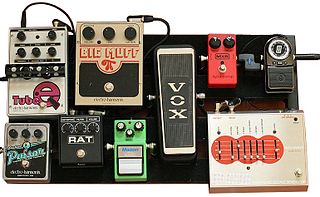
An effects unit, effects processor, or effects pedal is an electronic device that alters the sound of a musical instrument or other audio source through audio signal processing.
Wah-wah is an imitative word for the sound of altering the resonance of musical notes to extend expressiveness, sounding much like a human voice saying the syllable wah. The wah-wah effect is a spectral glide, a "modification of the vowel quality of a tone".
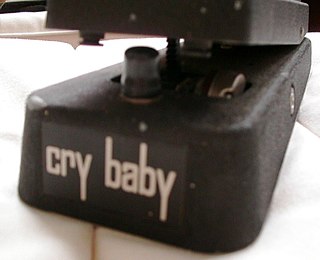
A wah-wah pedal, or simply wah pedal, is a type of effects pedal designed for electric guitar that alters the timbre of the input signal to create a distinctive sound, mimicking the human voice saying the onomatopoeic name "wah-wah". The pedal sweeps a band-pass filter up and down in frequency to create a spectral glide. The wah-wah effect originated in the 1920s, with trumpet or trombone players finding they could produce an expressive crying tone by moving a mute in, and out of the instrument's bell. This was later simulated with electronic circuitry for the electric guitar when the wah-wah pedal was invented. It is controlled by movement of the player's foot on a rocking pedal connected to a potentiometer. Wah-wah effects may be used without moving the treadle as a fixed filter to alter an instrument’s timbre, or to create a "wacka-wacka" funk-styled rhythm for rhythm guitar playing.
Elektron is a Swedish developer and manufacturer of musical instruments founded in 1998, as well as having its headquarters, R&D and production in Gothenburg, Sweden. They produce mainly electronic musical instruments, but have also made effects units and software. Since 2012, there have been branch offices in Los Angeles and in Tokyo.
A phaser is an electronic sound processor used to filter a signal by creating a series of peaks and troughs in the frequency spectrum. The position of the peaks and troughs of the waveform being affected is typically modulated by an internal low-frequency oscillator so that they vary over time, creating a sweeping effect.

Electro-Harmonix is a New York City-based company that makes electronic audio processors and sells rebranded vacuum tubes. The company was founded by Mike Matthews in 1968. It is best known for a series of guitar effects pedals introduced in the 1970s and 1990s. EHX also made a line of guitars in the 1970s.

The Boss DS-1 is a distortion pedal for guitar, manufactured by the Roland Corporation under the brand name Boss since 1978. The first distortion effects unit made by Boss, it has become a classic effect, used by many notable guitar players.

Moogerfooger is the trademark for a series of analog effects pedals manufactured by Moog Music. There are currently eight different pedals produced; however, one of these models is designed for processing control voltages rather than audio signal. A sixth model, the Analog Delay, was released in a limited edition of 1000 units and has become a collector's item. Moog Music announced on August 28, 2018, that the Moogerfooger, CP-251, Minifooger, Voyager synthesizers, and some other product lines were being built using the remaining parts on hand and discontinued thereafter.
DOD Electronics, or simply DOD, also known as their brand name DigiTech, is an American manufacturing company that makes guitar effects pedals, as well as active crossover gear. DOD is owned by Cortek, the parent company of Cort Guitars. Their DigiTech Whammy pedal has been called "one of the most significant innovations in pedal tech".

Auto-wah is a type of wah-wah effects pedal typically used with electric guitar, bass guitar, clavinet, and electric piano etc. The distinctive choppy rhythm guitar sound on many funk and disco recordings from the 1970s popularized the effect.

Musitronics, often shortened to Mu-tron, was a manufacturer of electronic musical effects active in the 1970s. Founded by Mike Beigel and Aaron Newman, the company's products provided filtering and processing effects and were derived from synthesizer components. The company was known for producing high-quality products with many user-adjustable parameters, but high production costs and a failed product line, the Gizmotron, caused its downfall.

Distortion and overdrive are forms of audio signal processing used to alter the sound of amplified electric musical instruments, usually by increasing their gain, producing a "fuzzy", "growling", or "gritty" tone. Distortion is most commonly used with the electric guitar, but may also be used with other electric instruments such as electric bass, electric piano, synthesizer and Hammond organ. Guitarists playing electric blues originally obtained an overdriven sound by turning up their vacuum tube-powered guitar amplifiers to high volumes, which caused the signal to distort. While overdriven tube amps are still used to obtain overdrive, especially in genres like blues and rockabilly, a number of other ways to produce distortion have been developed since the 1960s, such as distortion effect pedals. The growling tone of a distorted electric guitar is a key part of many genres, including blues and many rock music genres, notably hard rock, punk rock, hardcore punk, acid rock, grunge and heavy metal music, while the use of distorted bass has been essential in a genre of hip hop music and alternative hip hop known as "SoundCloud rap".

The Evolver is an analog-digital hybrid synthesizer designed by Dave Smith and manufactured by Dave Smith Instruments. It was first released as a desktop version in 2002, then later a 37-key keyboard bearing the same synth engine as the Evolver desktop was also released. A polyphonic version of the Evolver, dubbed the Poly Evolver, was released in 2004 as a rackmount version, then a 61-key keyboard version of the Poly Evolver was released in 2005. The Evolvers were replaced by new high end models, the Prophet 12 and the Pro 2.
A slicer is an effects unit which is similar to a tremolo, vibrato, phaser, or autopan. It combines a modulation sequence with a noise gate or envelope filter to create a percussive and rhythmic effect like a helicopter, with rapid cutting out and coming in—on and off. Most have variable speeds and depths, creating different sounds. It may be implemented through an effects unit or a VST. The Boss SL-20 is an example of a slicer effect in a guitar pedal.
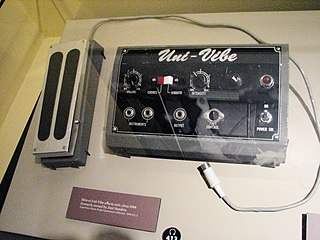
The Uni-Vibe, also marketed as the Jax Vibra-Chorus, is a footpedal-operated phaser or phase shifter for creating chorus and vibrato simulations for electric organ or guitar. Designed by audio engineer Fumio Mieda, it was introduced in the 1960s by Japanese company Shin-ei originally branded as the Vibra-Chorus. The effect was modified to have easier access to its fuse, and a speed control foot pedal was added. It was later released in North America by Univox in 1968.

The Korg PS-3300 is a polyphonic analog synthesizer released by Korg in 1977. It was released alongside the PS-3100, a more compact variant featuring a complete synthesizer voice board for each of its 48 keyboard notes. The PS-3300 essentially combines three PS-3100 units, triggering all voices simultaneously with each key press and mirroring the PS-3100's overall design, featuring a total of 144 synth voices. The PS-3300 uses the PS-3010, a detachable keyboard equipped with an assignable joystick called the X-Y Manipulator.
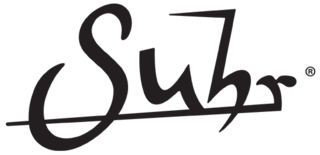
Suhr Guitars is an American company that manufactures electric guitars and basses, guitar amplifiers, and effect units. The company is based in Lake Elsinore, California and was founded in 1997 by John Suhr, who "has a reputation for building exquisitely crafted guitars" and Steve Smith.
Source Audio is a guitar effects pedal company based near Boston, Massachusetts. They produce modular effects pedals for electric guitar and bass, such as the Nemesis Delay, Ventris Dual Reverb, and Collider Delay+Reverb, as well as the C4 Synth, a modular rack synthesizer in pedal format, the Aftershock Bass Distortion, and the EQ2, a 10-band parametric equalizer with a plug-in style desktop interface. They are also the creators of the Hot Hand Wireless Effects Controller, a device worn around the finger that uses an accelerometer to send expression signal to an effect like an envelope filter. Source Audio mainly uses DSP to create their effects, and are known to program their own processor chips.
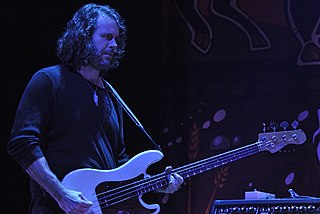
Tim Lefebvre is an American bass guitarist. Both as a session musician and band member, he has worked with a wide range of musicians, including David Bowie, The Black Crowes, Elvis Costello, Sting, Empire of the Sun, The Sleepy Jackson, Wayne Krantz, Patti Austin, John Mayer, Jovanotti, Chuck Loeb, Mark Guiliana, Jamie Cullum, Chris Botti, and Knower. A member of the Tedeschi Trucks Band until 2018, he also performed on film and television soundtracks, including Ocean's Twelve, The Departed, Analyze That, The Sopranos, and 30 Rock.

Neil Young Archives Volume II: 1972–1976 is a 10-CD box set from American-Canadian folk rock musician Neil Young that was initially released in a limited deluxe box set on November 20, 2020. The release is the second box set in his Neil Young Archives series, following 2009's The Archives Vol. 1 1963–1972, and covers a three-and-a-half-year period from 1972 to 1976. The track list was officially announced on the Neil Young Archives site on September 20, 2020, with the first single, "Come Along and Say You Will", being posted to the site as the Song of the Day on October 14. The set then went up for pre-order on October 16, 2020, as an exclusive release to his online store, with only 3,000 copies being initially made available worldwide. After selling out the following day, Young announced several weeks later that a general retail version, as well as a second pressing of the deluxe box set, is expected to be released to market on March 5, 2021. This was followed by the release of a second single, "Homefires", on October 21, and a third, an alternate version of "Powderfinger", on November 3.